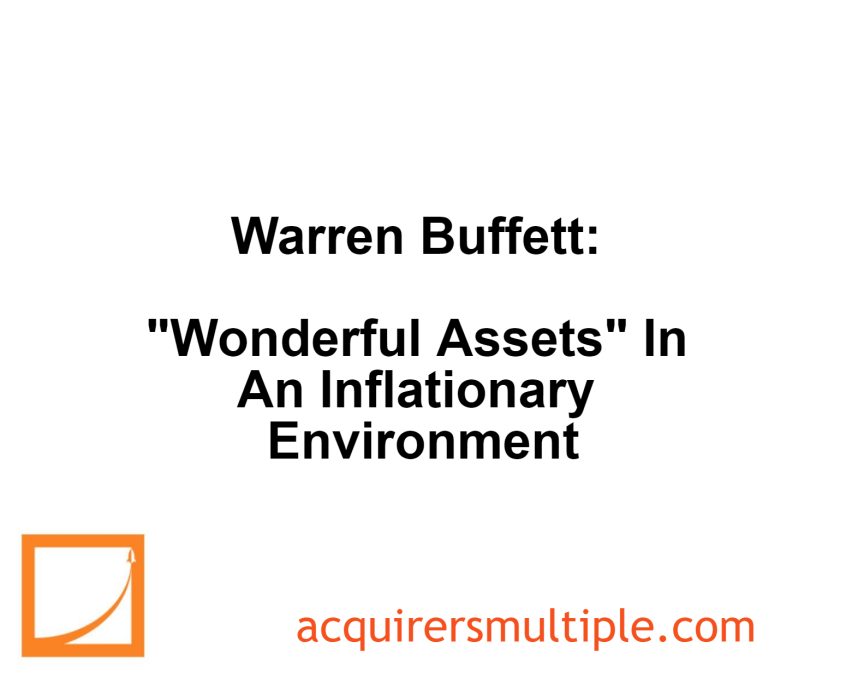During the 2011 Berkshire Hathaway Annual Meeting, Warren Buffett explained why the best asset to hold in an inflationary environment is a high return on tangible capital business that requires very little capital to grow, such as See’s or Coke. He calls these businesses “wonderful assets” because they can continue to generate more revenue and profits even if the price level doubles without having to make any significant additional investments. Here’s the question from the audience member, and Buffett’s response:
AUDIENCE MEMBER: My question is, aside from the need to put huge amounts of capital to work, do you still believe that a high return on tangible capital business, like See’s or Coke, is the best asset to hold in an inflationary environment, or do you now think an irreplaceable hard asset with pricing power, like a railroad or a hydroelectric dam, is superior?
WARREN BUFFETT: The first group is superior. I mean, if you can have a wonderful consumer product — doesn’t have to be a consumer product — a product that requires very little capital to grow, and to do more dollar volume, as will happen with inflation even if you don’t have unit growth, and it doesn’t take much capital to support that growth, that is a wonderful asset to have in inflation.
I mean, the ultimate test of that is your own earning ability. I mean, if you’re an outstanding doctor, lawyer, whatever it may be, teacher, the — you — as inflation goes along, your services will command more and more in dollar terms, and you don’t have to make any additional investment in yourself.
People think of that, you know, with a very long-lived real estate asset or something of the sort, or a farm, or anything where additional capital is not required to finance inflationary growth.
The worst kind of businesses are the businesses with tons of receivables and inventories and all of that.
And in dollar terms, if their volume stays flat but the price level doubles, and they need to come up with double the amount of money to do that same volume of business, that can be a very bad asset.
Now normally, we are not enthused about businesses that require heavy capital investment, just like utilities and the railroad.
We think that, on the other hand, particularly with the railroad, that where you do not have any guaranteed lower rate of return, that you should be entitled to earn returns on assets that are becoming more and more valuable to the economy as — whether it’s because of inflationary factors or because of just natural growth factors, or in the case of the United States, I think it will be both.
But the ideal business — See’s Candy is doing — it was doing $25 million of volume when we bought it, and it sold 16 million pounds of candy — a little more than — well, it retails $1.90, and we had some quantity discounts, so we were doing close to $30 million worth of business.
Now, we’re doing well over $300 million worth of business. It took $9 million of tangible assets to run it when it was doing 30, and it takes about 40 million of tangible assets at 300-and-some.
So we’ve only had to ploy back $30 million into a business which will make us — well, it’s made us, probably, a billion-and-a-half pretax during that period.
And if the price of candy doubles, we don’t have any receivables to speak of. Our inventory turns fast. We don’t store it or anything like that. We gear up seasonally and the fixed assets aren’t big, so that is a much better business to own than a utility business if you’re going to have a lot of inflation.
Charlie?
CHARLIE MUNGER: And what’s interesting about it is that we didn’t always know this. And so — (Laughter)
WARREN BUFFETT: And sometimes we forget it. (Laughter)
CHARLIE MUNGER: That’s true, too.
But it shows how continuous learning is absolutely required to have any significant achievement at all in the world.
You can watch the entire discussion here:
For all the latest news and podcasts, join our free newsletter here.
Don’t forget to check out our FREE Large Cap 1000 – Stock Screener, here at The Acquirer’s Multiple:



